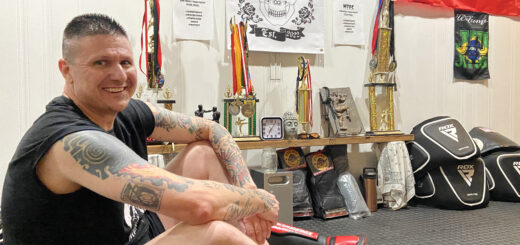Student-facilitated program hosts workshop to educate about dating, domestic, and sexual violence

By Cassie Weiss, Features Editor
The prevalence rates out there are scary when it comes to dating, domestic and sexual violence (DDSV), and how often it occurs right in front of our very eyes. It becomes one of those things that students always say won’t happen to them, and though we all hope that we will be able to feel safe and respected by our partners, that is not always the case.
The portrayal of unhealthy and abusive behaviours on television and all over our online news feeds remain one of the biggest challenges faced when it comes to the normalization of DDSV. It comes down to the reality that it is the responsibility of the person choosing violence to prevent it. One of the best ways to help with this normalization is by educating students on healthy behaviours.
Recognizing and understanding the signs is the first step in preventing any type of intimate partner violence, which accounts for a quarter of violent crimes reported to police, according to Statistics Canada.
Even though these numbers continue to rise throughout the country, one Mount Royal University (MRU) program called Stepping Up has been fighting since 2010 to educate faculty and students on the importance of “stepping up” against any and all forms of dating violence.
As a peer-facilitated program, Stepping Up is designed to explore the most current issues and trends relevant to students, such as dating and social media, bystander intervention and what it exactly means to be in a healthy relationship, said faculty lead Dr. Gaye Warthe.
“MRU is one of the only small number of universities with a focus on the promotion of healthy relationships and the prevention of DDSV,” said Warthe, who, along with Dr. Cathy Carter-Snell, both from the Faculty of Health, Community and Education, has made this project her “brain child”.
“Undergraduate students are in an age group most at risk of experiencing violence or abuse in relationships and of experiencing the most severe types of violence. Students are also more likely to turn to peers when they are in unhealthy or abusive relationships so it is important that any education or prevention focus on students.”
Throughout the course of the school year, the Stepping Up program works with students to create a two-day, four-module workshop that is held every year in February. The workshop is developed to create a discussion around these sensitive topics.
Backed by various community partners, the Healthy Campus Team, funded by the Alberta Government, and given effort by a few very passionate people, Stepping Up has created a brave space for students to come together to help contribute to a healthier campus community.
Statistics Canada reports that in the case of intimate partner violence, the most at risk are young women, young people, and those in dating relationships.
A study published in 2019, with the National College Health Assessment (NCHA), also states that “26.8 per cent of student respondents reported they had been in an intimate relationship that was emotionally, physically, or sexually abusive”, said Warthe.
As a health and wellness survey developed out of Harvard, the NCHA operates by contacting students to gain insights on a wide range of health issues. Because students are randomly selected, Warthe explained that there can be “generalizations made about the findings.” Of the students selected, 16 per cent indicated they had asked for help regarding the abuse that occured in an intimate relationship.
We all have the ability to step in and support someone who may be experiencing violence, and even one person with the proper knowledge can make a stand against DDSV.
“The normalization of DDSV occurs through our everyday conversations and influences, which is why the program was created around the social-ecological model,” said Michelle Chimenti, Stepping Up program coordinator.
“Challenging derogatory slang, for example, shows that type of behaviour is not okay and that the language folks use can have an influence on the responses and perceptions [other] folks have around DDSV. Trying to change the conversation is one of the first steps folks can take in their own lives.”
The Stepping Up program operates on campus but has shifted its workshop to online this year to help accommodate students during the COVID-19 pandemic. The workshop will be held on Feb. 2nd and Feb. 9th, from 4:00 p.m. until 6:30 p.m, and students can register for the workshop on the Stepping Up website. Students can also email Chimenti, at mchimenti@mtroyal.ca, and follow @mrulivewell on Instagram to stay up to date with the many wellness initiatives being offered through the university.
“This workshop offers an opportunity to analyze common scenarios folks may face around healthy, unhealthy, and abusive behaviours, as well as resources that folks can access if they need help,” said Chimenti.
“Too often, harmful narratives are perpetuated in common media; however, we hope that those who attend our workshop leave with a new perspective and the skills to examine and challenge what they see around them.”





